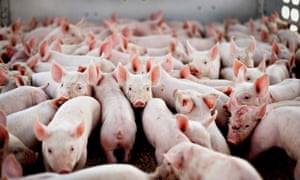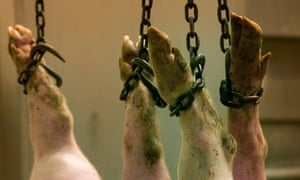A new rule in the US would eliminate food inspectors and lift limits on how quickly pigs can be killed. The impact on workers, animals and consumers would be disastrous.

The Trump administration has proposed a radical change in food safety protection. They’re misleadingly calling it the “Modernization of swine slaughter inspection rule”, but what it really does is roll back progress on protecting the public from serious and sometimes fatal diseases such as salmonella.
The proposal drastically reduces the number of trained government food inspectors in pork plants, turns over food safety functions to untrained plant managers, and by allowing for an unlimited increase in slaughter line speeds, puts public health, worker safety and animal welfare at risk.
Over the past few decades, the public has increasingly relied on the government to assure that, when it comes to food safety, the meat-packing industry won’t cut corners and endanger the health of our kids, our families and our communities. But the Trump administration has a different view of how much protection we all deserve.
The new proposal, which seeks to privatize the pork inspection system, would eliminate more than 140 food inspectors who now work in the nation’s hog slaughter plants. Most of the remaining government inspectors would be removed from the production lines. In their place, the proposal allows a smaller number of company employees – who are not required to receive relevant training – to conduct fewer inspections. In other words, it allows the industry to police itself, like the fox guarding the proverbial hen (or hog) house.
Of critical concern, the proposal removes any maximum limits on line speeds in pig slaughter plants. Pigs are already slaughtered at an astonishing rate of approximately 1,100 per hour. With this new rule, those speeds could reach up to 1,300 or even 1,500 pigs per hour. This will directly harm the health and safety of the nation’s tens of thousands of meat-packing workers, make it harder for the limited number of meat inspectors to do their jobs, and jeopardize the welfare of more than 100 million pigs each year.
The proposed increase in line speeds will result in higher injury rates for workers in our nation’s packing houses. Scores of studies show that pork workers already face serious injury rates three times higher than the national average, and illness rates that are 17 times higher. The pork processing industry is one of the most dangerous for workers. The already breakneck line speeds, coupled with the forceful and repetitive nature of the jobs in meat-packing plants, lead to high rates of devastating injuries and illnesses.
Faster lines and fewer inspectors won’t only have disastrous impacts on workers but also the animals they are tasked with processing. The removal of line speed caps has been shown to increase the chances for rough animal handling as employees feel the pressure to move pigs quickly through the slaughter. This increased speed can result in improper stunning that leads to animals being slaughtered while conscious. Fast line speeds may leave plant workers unable to detect signs of consciousness, or unable to stop the line in time to intervene.

Reducing the number of inspectors at pig slaughter plants will make an already precarious animal welfare situation worse. More federal oversight, not less, is needed to ensure adequate animal handling, welfare, and compliance with federal law and regulations.
Finally, the proposal will not even lead to safer food. A review of five plants that served as a pilot for this proposal reveals there were more food safety violations in these plants than in others. Additionally, a recent review by the USDA’s own office of inspector general found that the agency failed to provide adequate oversight of those plants, and the pilot plants may have a higher potential for food safety risks.
Adding insult to injury, the USDA issued this proposal without any final review of the impact on public health. The agency has not released all the data that supposedly supports the proposal, yet the public is only being given a few months to comment on this new system. How can stakeholders be expected to comment on a proposal without seeing the final scientific analysis on which it is based?
Clearly, the real goal of this proposal is to allow the meat-packing industry to increase its profits. It’s all about lining the pockets of a few corporate executives – at the expense of consumer health, worker safety and animal welfare.
We urge the USDA to consider the millions of lives – consumers, workers and animals – they are placing at incredible peril. They should reject any increase in line speeds and withdraw the so-called modernization of swine slaughter inspection rule.
- Deborah Berkowitz is a senior fellow for worker safety and health at the National Employment Law Project and the former chief of staff at the Occupational Safety and Health Administration; Suzanne McMillan is the content director for ASPCA Farm Animal Welfare Campaign.
You can read the original op-ed in The Guardian.



